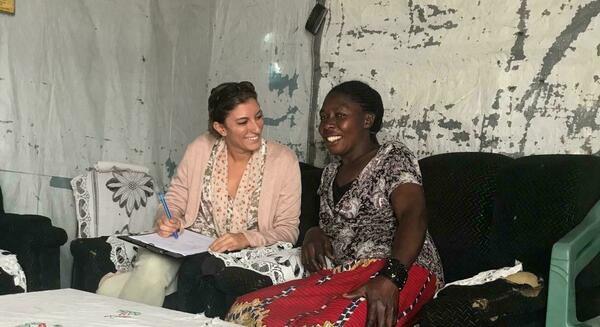
A former doctoral student affiliate who studies the livelihoods and survival strategies of women traders at the perilous border between the Democratic Republic of the Congo and Rwanda will receive the 2021 Kellogg Institute Award for Distinguished Dissertation on Democracy and Human Development.
Maryam Rokhideh, who now works on one of the largest United Nations initiatives on food security in low- and middle-income countries, received a joint PhD in peace studies and anthropology earlier this year through the Kroc Institute for International Peace Studies. Her dissertation, “The Political Economy of Insecurity: Livelihoods, Mobilities, and Support Networks of Women Traders on the Congo-Rwanda Border,” examines the structural drivers of insecurity and the ingenious strategies and safety nets women cultivate in their effort to support their families.
Rokhideh’s research makes substantial contributions to the study of human development and mobility by examining women’s work and socioeconomic contributions in conflict-affected areas, according to the two University of Notre Dame professors, both members of her dissertation committee, who nominated her for the award.
Catherine Bolten, an associate professor of anthropology and peace studies at the Kroc Institute, wrote that Rokhideh’s research tackles “fundamental questions about how the political economy of instability maps onto the bodies, lives, families, and social networks of women who are compelled by their poverty to risk bodily harm, harassment, and theft every day in the pursuit of small profit margins.”
“I am not overselling Maryam’s dissertation in the slightest when I say that it is a phenomenal piece of work, one that asks and answers critical questions about theories of resilience, mobility, and structural violence, which have recently become foundational to questions of human development,” she added.
Rokhideh spent more than two years conducting research for her dissertation along the Congo-Rwanda border. There, she used GPS, along with a rigorous mixed-methods methodology that included more than 100 interviews and social network analysis, to track the daily movements of female traders on both sides of the border and often accompanied them on their daily journeys.
Many of the Congolese and Rwandan women she interviewed were the primary breadwinners in their families and, in the post-conflict landscape, had few other options for supporting them. Rokhideh documented the hazards and physical hardships they encountered, from harassment from border agents to threats of sexual assault and theft. On average, each trader walked 12 to 15 miles per day while carrying at least 20 pounds of goods to sell.
On a daily basis, illness and accidents threated to derail their livelihoods – and their families’ survival.
“Everything is on my back,” one woman trader told her, echoing sentiments shared by other women in the study.
Faculty Fellow Maurizio Albahari, an associate professor of anthropology and a concurrent associate professor at the Keough School of Global Affairs, noted the originality and global relevance of Rokhideh’s research. While male-led trade has been widely studied, he wrote in his nomination letter that Rokhideh’s work examines a topic that has long been overlooked: how women traders provide a social safety net and contribute to socioeconomic development in their communities.
Her dissertation, he said, constitutes “a deep, empirically grounded and theoretically sophisticated analysis of the nexus between mobility, human rights, and integral human development” and serves as a model for graduate students in the social sciences.
“I assign it as required reading to any anthropology graduate student writer,” Albahari added.
Rokhideh is a senior research and country engagement specialist with the UN’s 50x2030 Initiative, a $500 million initiative aimed at strengthening country data systems and evidence-based policymaking to support rural development and food security in 50 low and lower middle-income countries across Africa, Latin America, Asia, and Middle East.
Last year, she was named a Woodrow Wilson Dissertation Fellow in Women’s Studies. Ten highly selective fellowships are awarded annually to humanities and social science doctoral candidates whose work addresses women’s and gender issues in interdisciplinary and original ways.
She also received a Notre Dame Presidential Fellowship and was awarded a Fulbright for her dissertation research in the Democratic Republic of Congo and Rwanda.
Rokhideh said Kellogg has played a “pivotal” role in her research and intellectual development, with a Kellogg Institute Research Grant funding her early work in Congo that that helped her focus the subject of her dissertation. Thanks to that grant, she spent several months studying Swahili and building a rapport with border communities, then collecting surveys that helped her identify the types of violence Congolese face every day.
Interactions with Kellogg faculty and visiting fellows also shaped her intellectual trajectory, she said, with a 2016 multidisciplinary workshop on aid and accompaniment inspiring her to develop a methodology of accompaniment for her research.
“Beyond research support, the Kellogg Institute and its intellectual community have been instrumental in shaping my development as an interdisciplinary scholar,” Rokhideh said. “I am grateful for these experiences at Kellogg as they have provided me with the intellectual grounding needed to understand and address pressing global issues that are beyond the scope of a single discipline.”
The annual dissertation award carries a $1,000 prize. Other members of Rokhideh’s dissertation committee were Faculty Fellow Ernesto Verdeja and Agustin Fuentes.